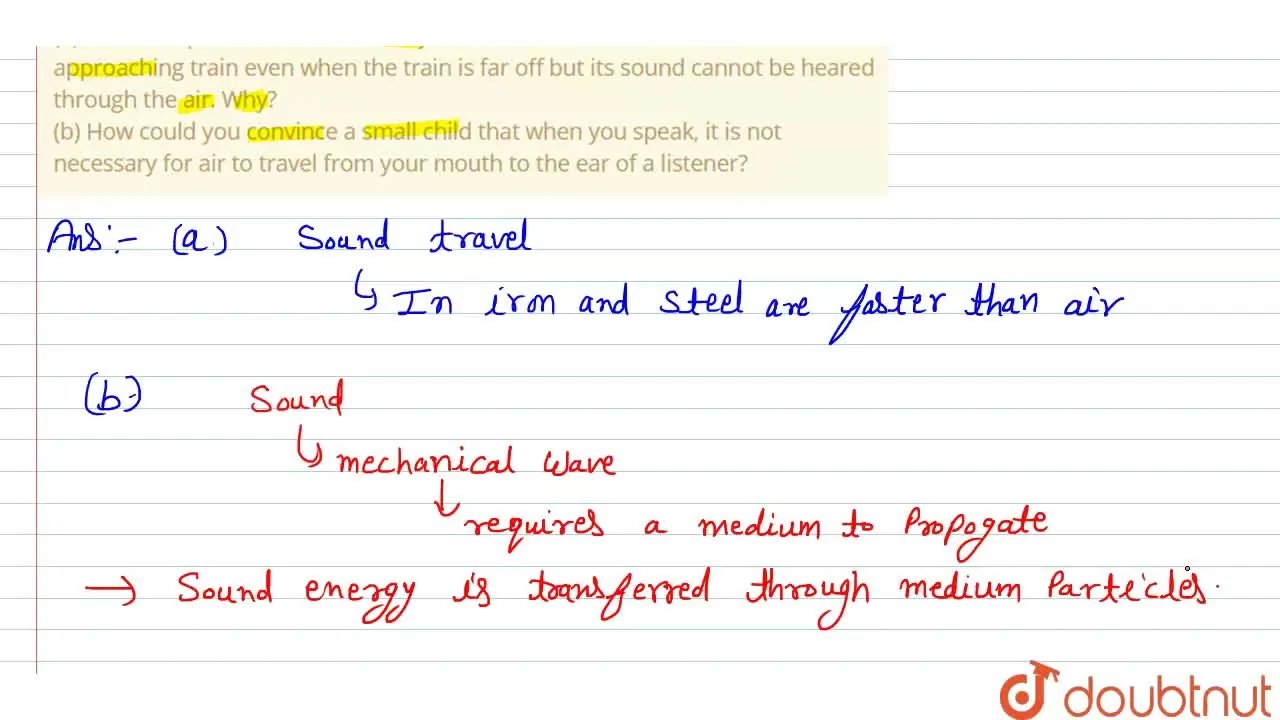(a) When we put our ear to a railway line, we can hear the sound of an approaching train even when the train is far off but its sound cannot be heared through the air. Why?
(b) How could you convince a small child that when you speak, it is not necessary for air to travel from your mouth to the ear of a listener?
Step by step video & image solution for (a) When we put our ear to a railway line, we can hear the sound of an approaching train even when the train is far off but its sound cannot be heared through the air. Why? (b) How could you convince a small child that when you speak, it is not necessary for air to travel from your mouth to the ear of a listener? by Physics experts to help you in doubts & scoring excellent marks in Class 9 exams.
Related Playlists
- BOOK - LAKHMIR SINGH & MANJIT KAURCHAPTER - SOUNDEXERCISE - HOTS8videos
SOUND
- BOOK - LAKHMIR SINGH & MANJIT KAURCHAPTER - SOUNDEXERCISE - Multiple Choice Questions37videos
SOUND
- BOOK - LAKHMIR SINGH & MANJIT KAURCHAPTER - SOUNDEXERCISE - Short Answer Type Questions25videos
SOUND
- BOOK - LAKHMIR SINGH & MANJIT KAURCHAPTER - MOTION EXERCISE - NCERT BOOK QUESTIONS AND EXERCISES3videos
MOTION
- BOOK - LAKHMIR SINGH & MANJIT KAURCHAPTER - WORK AND ENERGYEXERCISE - Multiple Choice Questions1videos
WORK AND ENERGY
Similar Questions
Ramesh and Sandeep are two very close friends who study in classes IX and X respectively. One day Ramesh and Sandeep had to go to a neighbouring twon on their bicycles for some work. They had to cross a railway line on the way to the neighbouring town. when Ramesh and Sandeep were going in the afternoon, the railway crossing barrier was open, so they did not have to wait for going across it. Their work in the neighbouring town kept Ramesh and Sandeep bust till late in the evening. On their way back home, when Ramesh and Sandeep reached the same railway crossing, it was quite dark in the night and the railway crossing barrier was down (or closed) indicating that some train was expected to pass through soon. Ramesh was in a hurry to go back home. Ramesh told Sandeep that since he could not hear the sound of approaching train, so they did not know when the train would pass through the crosing and barrier would open. He suggested that instead of keeping on waiting, they should cross the railway tracks by going below the closed barrier by tilting their bicycles and lowering their heads. Sandeep did not agree with Ramesh. Sandeep said that they would not cross the railway tracks as long as the barrier was closed. Suddenly, Ramesh slipped through the barrier and put his ear on the railway track. Sandeep pulled him away from the railway track quickly. As soon as Ramesh was pulled away from the railway track, a super-fast train passed through the same track in the darkness of night without blowing any horn. Sandeep was very angry with Ramesh and scolded him for the risk he had taken. After the train passed through the crossing, the barrier was opened by railway staff. Ramesh and Sandeep then crossed the railway track alongwith their bicycles and reached home safely.
(a) How many times more is the speed of sound in railway track then the speed of sound in air?
(b) Why did Sandeep not allow Ramesh to cross the closed barrier of railway crossing?
(c) Why did Ramesh put his ear to the railway track?
(d) Why did Sandeep pull Ramesh away from the railway track?
(e) What values are displayed by Sandeep in this episode?View SolutionWhen we hear a sound ,we can identify its source from
View SolutionWhen we hear a sound, we can identify its source from
View SolutionIf one puts ones ears to the steel rail, the sound of a coming train can be heard even when the train cannot be seen. One can conclude from this observation that
(1) sound travels faster in steel than in air.
(2) amplitude of sound in the rail is much larger than in air.
(3) sound can travel larger distances in solids than in air.
(4) quality of sound in rail is better than in air.
The reasonable conclusions areView Solution(a) How is sound produced? Explain with the help of an example.
(b) How does sound from a sound producing body travel through air to reach our ears? Illustrate your answer with the help of a labelled diagram.View SolutionI put one ear on a steel railroad track.
A. I am able to hear the approaching train sooner through the track than through the air
B. Sound travels faster through steel as compared to air.
C. Sound travels faster through solids as compared to gases.
Of the above three statements, identify which ones are observations and which are inferences.View SolutionI put one ear on a steel railroad track.
A. I am able to hear the approaching train sooner through the track than through the air.
B. Sound travels faster through steel as compared to air.
C. Sound travels faster through solids as compared to gases.
Of the above three statements, identify which ones are observations and which are inferences.View SolutionWrite the following steps in sequence to show that sound is propagated through solids.
(a) You will be able to hear two distinct sounds, one propagated through the metallic rod and other propagated through air.
(b) Thus, sound can be propagated through both solids and gases.
(c) Take a long metallic rod, place one end of the rod near your ear and ask your friend to hit the other end.View SolutionWrite the following steps in sequence to show that sound is propagated through solids.
(a) You will be able to hear two distinct sounds, one propagated through the metallic rod and other propagated through air.
(b) Thus, sound can be propagated through both solids and gases.
(c) Take a long metallic rod, place one end of the rod near your ear and ask your friend to hit the other end.View Solution(a) In a quiet room, put thumbs in your ears firmly and listen. You hear a low pulsating sound. Why ?
(b) Why such low pulsating sounds are not normally heard ?View Solution


